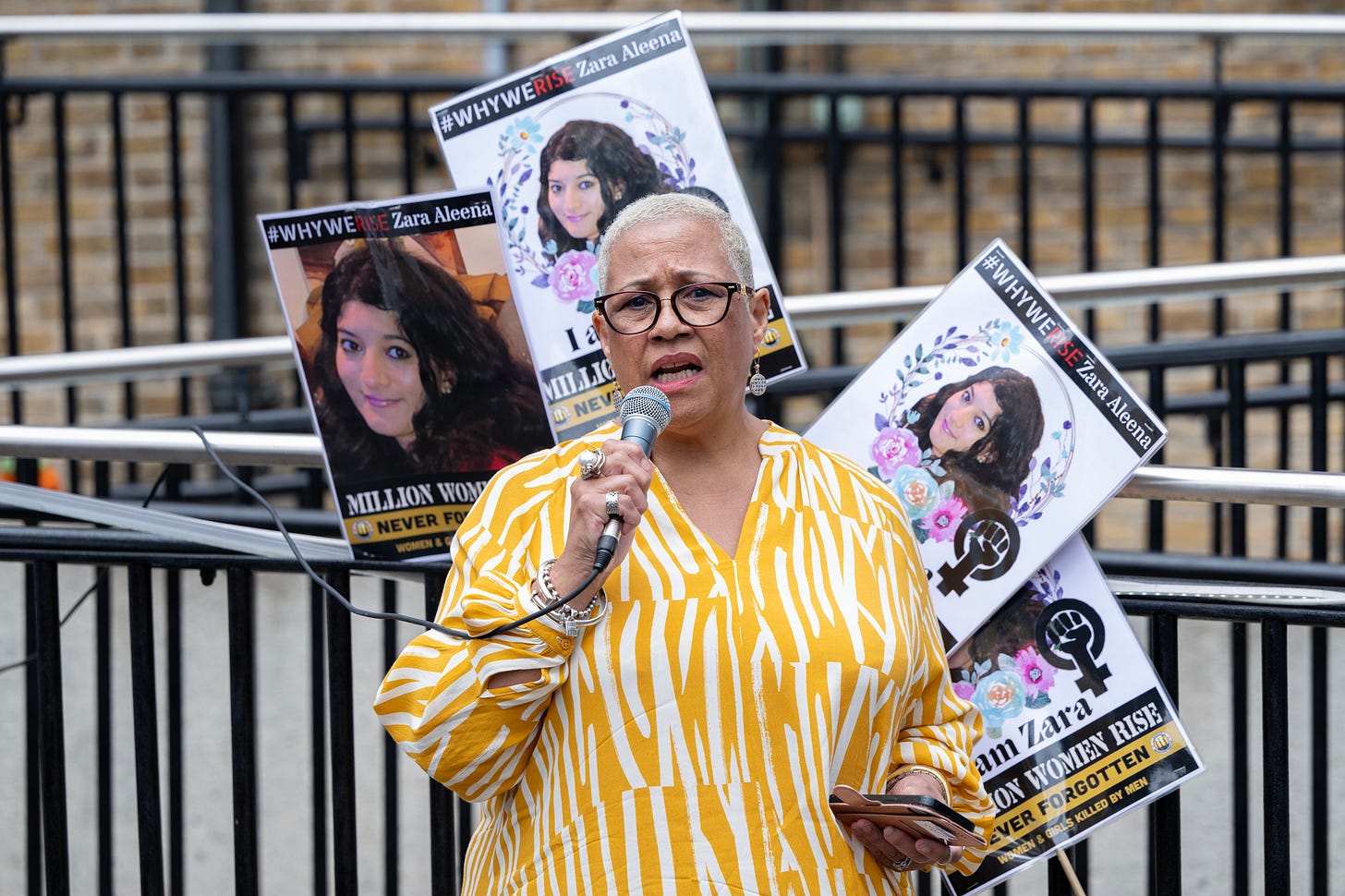United by the worst thing imaginable
Attending a vigil for Zara Aleena, and reflections on a failing justice system.

On Sunday afternoon, a crowd of people gathered outside an art gallery in Ilford, in east London. They were all wearing white, and many held placards with photographs of a smiling woman with dark curly hair and the words “Zara Aleena, never forgotten” or “Together we walk for Zara, united against male violence.” This was a vigil, organised by Zara’s family, to mark two years since the 35-year-old was sexually assaulted and brutally murdered by a stranger as she walked home from a night out.
Last year, I published a long piece about Zara - what happened to her, the person she was, and her family’s urgent fight to create meaning from this senseless tragedy. I have kept in touch with her family since then. Zara’s case has stayed with me perhaps more than anything else I’ve written about, for a number of reasons. When she died, we were the same age, and both Londoners of Pakistani origin. Her aunt Farah Naz knows my mum, which is how I ended up covering the case. Talking to Zara’s family and friends in the immediate aftermath of her murder, I had a real sense of what a wonderful person she was - someone who made time for everyone, was always ready to laugh - and how much her loved ones had lost. But it’s more than that too: the fact that systemic failings so clearly contributed to her death.
Despite the fact that most violence against women happens at the hands of someone they know, over the last few years, the names of women murdered by strangers have become totemic: Zara Aleena, Sarah Everard, Bibaa Henry and Nicole Smallman, Sabina Nessa, Jan Mustafa. These names are used as a shorthand for the ways in which society fails to protect women - misogynistic policing, a crumbling justice system and the prevalence of male aggression in public spaces. The names are undeniably powerful. But it can also be easy to forget that these were real women, with real families experiencing unimaginable grief. At the vigil on Sunday, this grief was front and centre. Zara’s friends and family wept, alongside members of the local community, politicians and women’s rights activists. It was an event both personal and political.
One of the most extraordinary things was that so many other families of women whose names have become emblematic were in attendance. Mina Smallman, mother of Bibaa Henry and Nicole Smallman - murdered by a stranger in a park in 2020 - gave a rousing and furious speech: “I am campaigning because two women of colour didn’t matter to the police.” (The Smallman family had to conduct their own search when Bibaa and Nicole went missing, as police didn’t help, and later two police officers were jailed for taking selfies with the sisters’ dead bodies). Sarah Everard’s parents were in the crowd, as were relatives of Sabina Nessa and Jan Mustafa. These families are united by the absolute worst thing imaginable, members of a grim club that no-one would choose. In her speech, Andrea Simon, director of the End Violence Against Women campaign, thanked them for channelling their trauma into activism: “Your fortitude is a gift to women and girls.”
After a series of emotional, angry speeches, the group marched through Ilford to the residential street where Zara was murdered. Here they held a minute’s silence for murdered women, before symbolically walking Zara home: she was murdered just 10 minutes from her own house. This was the third vigil the family has held; the first took place in 2022, just a week after the murder. At the time, Zara’s aunt Farah told me: “We needed to do something before we became paralysed with grief. I’m not going to get closure, but the community held us in their arms that day as if to remind us not to give up on humanity.”
Just a few days before the crowd gathered in Ilford, the inquest into Zara’s death concluded. It confirmed what her family had long suspected: that her death was preventable. Her attacker Jordan McSweeney was only free because of failings by probation, police and the prison service. As I wrote last January, when the probation inspectorate report on the case came out, he had 28 convictions for 69 previous offences, and a documented history of domestic violence. He had served nine prison sentences with more than 100 incidents in prison. But despite all this, when he was released on probation in June 2022, his risk level was classified as “medium” because his offences, behaviour in prison and wider criminal history were not considered as a whole. This “medium” risk designation meant that when he failed to turn up for a single probation meeting after his release, the decision to recall him to prison was not treated with urgency.
The inquest elaborated on these failings, concluding: “Zara's death was contributed to by the failure of multiple state agencies to act in accordance to policies and procedures - to share intelligence, accurately assess risk of serious harm, [and] act and plan in response to the risk in a sufficient, timely and coordinated way". In an emotional address to the vigil on Sunday, Farah spoke about how painful the inquest has been, but said: “It was something that was right. The whole process was right. Some things work.” That really struck me. It seems such faint comfort that one single process should work, when so many systems in this case - and countless others - miserably failed.
I have been thinking a lot about the impact of failing systems over the last couple of weeks, as the general election approaches and the country takes stock of what 14 years of disastrous Conservative rule have done to Britain. On Sunday I published a Guardian comment piece about catastrophic issues in the criminal justice system, which multiple agencies and experts warn is literally on the verge of collapse. In and of themselves, the stats are shocking:
On average, it now takes nearly two years for a criminal case heard in crown court to go from offence to verdict. This creates a fundamental problem with access to justice, as criminal cases are more likely to collapse as victims of crimes – desperate to move on with their lives – withdraw from legal proceedings. It’s a chicken-and-egg situation. Delays in the court system mean there is now the highest number of prisoners on remand for 50 years in England and Wales, while overcrowded prisons – caused in part by people spending months on remand – further delay the courts.
It is no surprise that the criminal justice system has reached this point. Successive government policies have seen UK prisoner numbers more than double over the past 40 years – from about 41,000 in the early 1990s to 88,000 today. This long-term trend has been turbocharged since the election of the Conservatives in 2010, the party simultaneously championing longer sentences while slashing budgets for prisons, legal aid and courts. Since 2008, the number of adults sentenced to more than 10 years in prison has trebled, while the Ministry of Justice – responsible for prisons and courts – saw unprecedented cuts: 43% of all courts in England and Wales have closed.
Prisons, courts and the probation service are all at breaking point, beset variously by staff shortages, lack of expertise after botched reforms, underfunding and high demand. In this context it is little surprise that grave errors were made in McSweeney’s case. On Sunday, Clare Waxman, the victim’s commissioner, addressed the crowd and summed it up succinctly: “Every agency failed: police, probation and prisons. These failings led to Zara’s death. Her death was preventable.” This is the strongest case for change I have ever heard.
Reading/listening
This Guardian essay about the absolute mess of university finances is illuminating and perceptive.
I’ve been enjoying Fur and Loathing, a podcast investigating a 2014 chlorine gas attack on a furry convention.
Last week I revisited this remarkable 2015 Propublica story about a rape investigation, and it is just as good as I remembered - thoroughly reported, sensitively told and gripping. (It’s also been adapted into a Netflix miniseries).
Thanks so much for reading. As always, if you found this post interesting or useful, do share it online or forward to someone else who might like it. And if you are in the UK, get out and vote today! I’ll be back in a couple of weeks.
.





